Hong Kong’s property market remains resilient, but uncertainty persists
Over the past decade, Hong Kong’s residential property prices have skyrocketed by 243% (153% inflation-adjusted), including spectacular growth of 28.5% in 2009, 21% in 2010, and 25.7% in 2012. In contrast, real incomes have virtually stagnated in Hong Kong for years.
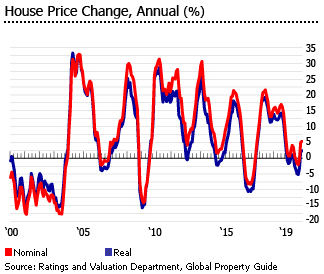
Now, despite market-cooling measures, the impact of continuing violent protests, the US-China trade war and the coronavirus outbreak, Hong Kong’s housing market remains resilient.
Hong Kong’s residential property price index rose by 5.31% during 2019, a sharp improvement from the prior year’s 1.9% growth, according to the Ratings and Valuation Department (RVD). When adjusted for inflation, residential property prices increased 2.38% y-o-y in 2019. During the latest quarter, prices fell slightly by 0.76% (-1.21% inflation-adjusted) in Q4 2019.
Prices of dwellings continue to rise, except for largest-sized, apartments, whose prices have been falling sharply in Kowloon and New Territories.
- Apartments smaller than 40 sq. m: prices rose by 1.74% y-o-y in 2019, to an average of HK$ 183,550 (US$ 23,634) per sq. m.
- 40-69.9 sq. m. apartments: prices rose by 4% y-o-y to HK$ 183,381 (US$ 23,612) per sq. m.
- 70-99.9 sq. m. apartments: prices increased 1.04% y-o-y to HK$ 212,776 (US$ 27,397) per sq. m.
- 100-159.9 sq. m. apartments: prices rose strongly by 6.58% y-o-y to HK 247,300 (US$ 31,843) per sq. m.
- Apartments with sizes bigger than 160 sq. m: prices fell slightly by 1.07% y-o-y to HK$ 283,311 (US$ 36,479) per sq. m. during 2019
During 2019, property transactions in Hong Kong rose slightly by 0.6% to 57,606 units from a year earlier, according to the RVD.
Construction, however, is plunging. In 2019, completions fell sharply by 35% to 13,643 units from the previous year, after y-o-y rises of 18% in 2018, 22% in 2017 and 29% in 2016.
AVERAGE HOUSE PRICES, 2019 |
|||||||||
| Average prices (per sq. m.) | Year-on-year change (%) | ||||||||
| Property size | Hong Kong | Kowloon | New Territories | Hong Kong | Kowloon | New Territories | |||
| HKD | USD | HKD | USD | HKD | USD | ||||
| Less than 40 sq. m | 183,550 | 23,634 | 157,239 | 20,246 | 144,536 | 18,611 | 1.74 | 4.90 | 4.42 |
| 40-69.9 sq. m | 183,381 | 23,612 | 153,446 | 19,758 | 125,493 | 16,159 | 4.00 | 4.27 | 4.52 |
| 70-99.9 sq. m | 212,776 | 27,397 | 187,987 | 24,205 | 132,507 | 17,062 | 1.04 | 5.87 | 3.31 |
| 100-159.9 sq. m | 247,300 | 31,843 | 204,744 | 26,363 | 122,166 | 15,730 | 6.58 | 5.00 | 4.95 |
| Greater than 160 sq. m | 283,311 | 36,479 | 239,799 | 30,877 | 95,646 | 12,315 | -1.07 | -11.22 | -7.33 |
| Sources: Ratings and Valuation Department (RVD), Global Property Guide | |||||||||
From 2008 to 2013, Hong Kong dwelling prices skyrocketed by 134% (95.7% inflation-adjusted), driven by a flood of money in the wake of the global financial crisis.
The market slowed in the first half of 2014, but bounced back in the second half, with prices rising by 13.6% in Q4 2014, 19.6% in Q1 2015, 20.4% in Q2 2015, and 15% in Q3 2015.
After a brief housing market slowdown, house prices surged again by 41.5% (35.5% inflation-adjusted) from H2 2016 to H1 2018.
The housing market slowed from end of 2018 until the first half of 2019 due to macro uncertainties and social unrest. But surprisingly, house prices bounced back at the end of 2019.
This is puzzling because Hong Kong´s economy is suffering, having contracted by 1.2% in 2019 – the first annual decline since 2009. Economic forecasts for 2020 vary from growth of 0.5% to 1%, to a huge contraction of 5.8%.
Hong Kong property market remains the world’s most unaffordable
Housing demand in Hong Kong has been propelled by a combination of stringent government regulations on development, low interest rates, and currency stability; while the supply of land, which the government controls, continues to diminish.
Hong Kong’s currency peg to the dollar kept borrowing costs near record lows, fuelling continued property demand.
HOUSE PRICE INDEX, ANNUAL CHANGE (%) |
||
| Year | Nominal | Inflation-adjusted |
| 2009 | 28.5 | 26.5 |
| 2010 | 21.0 | 17.7 |
| 2011 | 11.1 | 5.1 |
| 2012 | 25.7 | 21.2 |
| 2013 | 7.7 | 3.3 |
| 2014 | 13.6 | 8.2 |
| 2015 | 2.4 | 0.1 |
| 2016 | 7.9 | 6.6 |
| 2017 | 14.7 | 12.8 |
| 2018 | 1.9 | -0.6 |
| 2019 | 5.3 | 2.4 |
| Sources: Ratings and Valuation Department, Global Property Guide | ||
For the tenth year in a row, Hong Kong’s property market is rated the world’s most unaffordable by the 16th Annual Demographia International Housing Affordability Survey: 2020. Average home prices were 20.8 times gross annual median household income in 2019, slightly down from 20.9 times in 2018, but up from 19.4 times in 2017, 18.1 times in 2016, 19 times in 2015, 17 times in 2014 and 12.6 times in 2013.
This is in line with Mercer’s 2019 Cost of Living Survey, which ranked Hong Kong as the world’s most expensive city for expatriates to live in.
Among 24 major cities in the 2019 UBS Real Estate Bubble Index, Hong Kong’s house prices remain one of the most overvalued and at a greatest risk of a real estate bubble.
“Fueled by strong investor demand, general positive sentiment and the fear of missing out on capital gains, the real price level in Hong Kong more than doubled between 2008 and 2018,” said UBS.
“Recently, however, momentum in this red-hot property market has stalled. Overall, the UBS Global Real Estate Bubble Index score has crept down, but the market remains firmly in bubble-risk territory.”
Primary sales up; secondary sales down
During 2019, the number of property transactions in Hong Kong rose slightly by 0.6% to 57,606 units, while sales values fell by 1.9%, according to the RVD.
But these figures conceal huge variations:
- Primary market property sales rose strongly by 21% y-o-y to 18,917 units, based on data from RVD. Likewise, total transaction values increased 3.7% to HK$ 227.6 billion (US$29.3 billion).
- Secondary market property sales fell 7% to 38,689 units, and transaction values fell by 5.5% to HK$ 321.19 billion (US$41.36 billion).
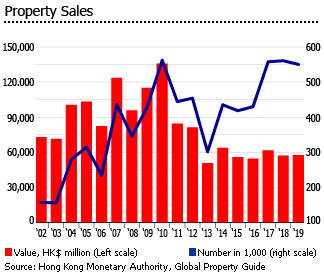
Residential construction activity plummeting
Completions fell by a whopping 35% in 2019. During 2019:
- Class A completions (properties with an area of 40 sq. m. and below) fell by 8.2% y-o-y to 6,622 units, in contrast to a 4.7% rise in 2018.
- Class B completions (40 to 69.9 sq. m.) plunged by 49.3% y-o-y to 4,174 units, following a 7.5% increase in the prior year.
- Class C completions (70 to 99.9 sq. m.) fell sharply by 55.9% to 1,506 units, a sharp turnaround from the prior year’s growth of more than 90%.
- Class D completions (100 to 159.9 sq. m.) fell by 33.5% to 1,025 units, in contrast to the previous year’s 46% growth.
- Class E completions (160 sq. m. and above) plummeted by 44% y-o-y to 316 units, following a growth of more than 47% last year.
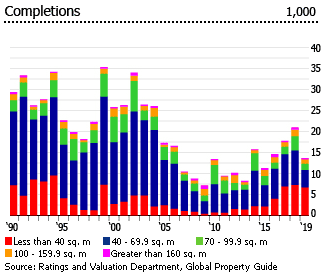
On the other hand, housing starts were almost steady at 18,500 units in 2019, according to the Transport and Housing Bureau.
How to solve Hong Kong’s chronic housing shortage?
Increasing supply is the key.
“We are looking at a shortfall of at least 1,200 hectares of land to meet our future supply and demand, and this is not taking into account extra land needed to improve the living space of each individual,” said Task Force chairman Stanley Wong Yuen-fai.
The government recently unveiled Hong Kong’s first major reclamation project since 2003, at an estimated cost of HK$20.5 billion (US$2.64 billion). Scheduled for completion by 2030, it will reclaim 130 hectares off northern Lantau and extend Tung Chung new town to provide 49,000 flats for 144,000 people, plus 870,000 sq. m. of commercial floor area.
“It will greatly help solve the current shortage of housing,” said Financial Secretary Paul Chan. Besides this, the government’s 10-year housing strategy aims to provide land for 28,000 public flats annually, alongside 18,000 private homes.
Currently, the total housing stock stood at 1,193,971 units, a 1.6% increase from the previous year, according to the RVD.
No intention to lift market-cooling measures
In early-2019, Financial Secretary Paul Chan indicated that the government has no plan of easing market-cooling measures, in an effort to fight speculative buying.
To discourage developers from hoarding, in June 2018 Carrie Lam introduced a vacancy tax on unsold homes that are not leased, or have remained unoccupied six months after receiving an occupation permit. The tax rate is two times of the rental income, or 5% of the home’s value.
Aside from the tax, the government also allocated nine plots of land, including three in the prime Kai Tak district, for public housing.
In addition, the Hong Kong Monetary Authority (HKMA) imposed new restrictions on bank lending to property developers in May 2017, restricting loans to property developers a maximum 40% of a site’s value, replacing the earlier limit of 50%. Also, the amount of loans allowed for residential property with value less than HK$10 million was reduced from 60% to 50% and those with value exceeding HK$10 million was also cut from 50% to 40%.
Also, a 30-person Land Supply Task Force was set up to consider long-term solutions to Hong Kong’s housing crisis, given the outcry about ‘coffin homes’.
In recent years, Hong Kong’s government has leaned against the property price rises:
- In November 2010, the government imposed a ‘flip tax’ of 15% on properties resold within six months (though in May 2014 the rule was somewhat relaxed), and doubled stamp duties to 8.5% on properties worth HK$20 million (US$2.6 million) or more.
- On October 26, 2012, the government imposed a 15% extra tax on property purchases made by foreigners.
- In February 2013, the government doubled the stamp duty on all property transactions worth more than HK$2 million (US$254,790), though again, this measure ended in May 2014.
- In April 2013, the Residential Properties (First-hand Sales) Ordinance to shield buyers from dishonest sales practices came into full effect.
- In February 2015, the government required buyers of self-used residential properties valued under HK$7 million (US$900,000) to make larger down payments.
- In November 2016, the government raised stamp duties for all property transactions to 15%, except for first time homebuyers who are charged just 4.25%. However, house price rises continued to accelerate, amidst a surge in the number of multiple home purchases on one single transaction as investors take advantage of lower tax rates.
- In an effort to close the loophole, the government also announced that first time homebuyers acquiring more than one property in a single contract will be charged the same 15% stamp duty that applies to purchases of a second property starting April 2017.
Interest rates are falling
The HKMA lowered its base rate by 25 basis points to 2% in October 2019, the third consecutive rate cut last year, following a similar move made by the Fed. Hong Kong’s currency has been pegged at circa HK$7.8 per U.S. dollar since October 1983, so when the US Federal Reserve interest rates move, so too do Hong Kong’s interest rates.
As a result in November 2019, HSBC Holdings PLC, Bank of China (Hong Kong), and Hang Seng Bank lowered their prime lending rates by 12.5 basis points to 5%. Likewise, China Citic Bank International, Standard Chartered Bank, and Bank of East Asia cut their rates to 5.25%, from 5.375%.
To support the ailing economy, amidst the coronavirus outbreak, from February 2020 HSBC and Citigroup are allowing residential mortgage borrowers in Hong Kong to make interest-only payments for up to a year. This comes a week after other banks, including Bank of China (Hong Kong), Bank of East Asia, China Citic Bank International, Dah Sing Bank, Hang Seng Bank, ICBC Asia, and Standard Chartered Bank, and DBS, among others, rolled out their own relief measures.
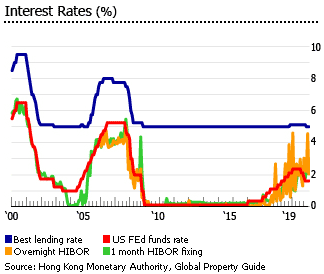
“We hope these measures will bring some relief to those who are under stress from the economic fallout of Covid-19, allowing them to focus on getting through these critical days without having to worry about their finances,” said Diana Cesar, HSBC’s Hong Kong chief executive.
New mortgage lending rising
New residential mortgage loans approved rose by 6.4% to 6,066 in December 2019, from 5,699 in the same period last year, according to according to Hong Kong Monetary Authority (HKMA). Likewise, the value of newly approved residential mortgage loans increased 13.2% y-o-y to HK$26.64 billion (US$3.43 billion) in December 2019.
As a result, the value of mortgage loans outstanding increased to a record HK$ 1.44 trillion (US$184.96 billion) in 2019, up 9.5% from a year earlier, based on figures from the HKMA.
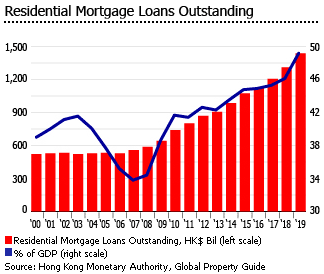
The average loan-to-value (LTV) ratio of newly approved loans also increased to 53.4% in December 2019, up from 46.3% in the same period last year.
Both the mortgage delinquency ratio (more than 6 months) and the rescheduled loan ratio were almost unchanged in December 2019, at 0.03% and 0% respectively.
Hong Kong’s rental yields remain low; rents falling
Hong Kong’s extremely low rental yields can be attributed to the surge in property prices in recent years. Hong Kong is not a ‘typical’ market. It is a place where the rich choose to park assets in the form of apartments, as part of a diversified asset-safeguard strategy - like Monaco and Singapore. Such markets typically have lower rental yields than more ‘normal’ housing markets.
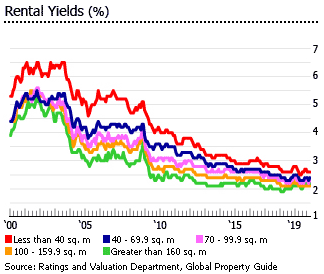
Rental yields are falling. In December 2019:
- Property Class A (properties with an area of 40 sq. m. and below) rental yields were 2.6%, down from 2.8% a year earlier.
- Property Class B (40 to 69.9 sq. m.) rental yields were 2.4%, slightly down from 2.5% from the previous year.
- Property Class C (70 to 99.9 sq. m.) rental yields were 2.3%, down from 2.4% a year earlier.
- Property Class D (100 to 159.9 sq. m.) rental yields were 2.1%, down from 2.2% a year earlier.
- Property Class E (160 sq. m. and above) rental yields were 2.2%, up from 2.1% a year earlier.
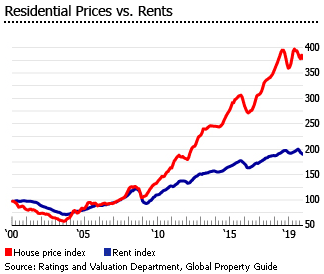
Rents are falling in Hong Kong, with larger-sized apartments registering the biggest rent declines. In December 2019, apartment rents for all classes fell by 1.8% from a year earlier.
In December 2019:
- Rents for apartments smaller than 40 sq. m. fell by 4.3% y-o-y, to an average of HK$ 472 (US$ 61) per sq. m. per month.
- Rents for 40-69.9 sq. m. apartments increased by a miniscule 0.2% y-o-y, to HK$ 428 (US$ 55) per sq. m. per month.
- Rents for 70-99.9 sq. m. apartments fell by 1.1% y-o-y, to HK$431 (US$56) per sq. m. per month.
- Rents for 100-159.9 sq. m. apartments fell by 2.9% y-o-y, to HK$435 (US$56) per sq. m. per month.
- Rents for apartments larger than 160 sq. m. plummeted by a huge 13.1% y-o-y, HK$405 (US$52) per sq. m. per month.
AVERAGE RENTS, DECEMBER 2019 |
|||||||||
| Average rents (per sq. m.) | Year-on-year change (%) | ||||||||
| Property size | Hong Kong | Kowloon | New Territories | Hong Kong | Kowloon | New Territories | |||
| HKD | USD | HKD | USD | HKD | USD | ||||
| Less than 40 sq. m | 472 | 61 | 378 | 49 | 311 | 40 | -4.26 | -2.83 | 1.63 |
| 40-69.9 sq. m | 428 | 55 | 338 | 44 | 271 | 35 | 0.23 | -5.06 | 3.04 |
| 70-99.9 sq. m | 431 | 56 | 378 | 49 | 267 | 34 | -1.15 | -0.79 | 2.69 |
| 100-159.9 sq. m | 435 | 56 | 386 | 50 | 265 | 34 | -2.90 | 1.31 | -5.02 |
| Greater than 160 sq. m | 405 | 52 | 374 | 48 | 275 | 35 | -13.09 | -16.52 | 7.84 |
| Sources: Ratings and Valuation Department (RVD), Global Property Guide | |||||||||
HK’s economy is struggling
After months of violent protests, real GDP declined by 1.2% in 2019 - the first annual decline since 2009. Now the coronavirus outbreak threatens to make things worse. In an effort to contain the contagion, retail stores, theme parks and other hotspots have closed and the government decided to restrict cross-border mobility, cancelled school for weeks, ordered civil servants to work from home and urged private companies to do the same.
“The US-China phase one trade deal and growth stabilization in China should have been positive for Hong Kong’s near-term economic outlook,” said Tommy Wu of Oxford Economics. “But it has been overshadowed by the coronavirus outbreak.”
For 2020 the Economist Intelligence Unit forecasts about 0.5% to 1% GDP growth, but Dutch bank ING expects the economy to contract by a huge 5.8%.
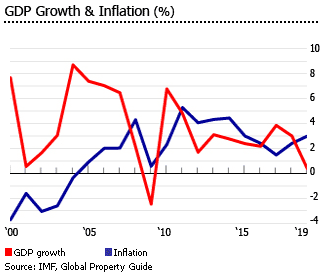
Hong Kong’s exports contracted by 4% y-o-y in 2019 and are expected to decline further by 2% this year, based on government estimates.
Tourism is plummeting. Visitor arrivals fell sharply by 14.2% to 55.9 million people in 2019 from a year earlier, in stark contrast to a y-o-y growth of 11.4% in 2018, mainly due to the ongoing social unrest, according to the Hong Kong Tourism Board. Mainland Chinese, who usually account for about three-fourths of annual arrivals in Hong Kong, fell by 14.2% y-o-y in 2019.
In December 2019, inflation was 2.9%, up from 2.5% in the same period last year, according to the Census and Statistics Department. Hong Kong’s inflation rate averaged 3.4% from 2011 to 2018.
While Hong Kong’s jobless rate remains low, it is rising. Unemployment was 3.3% in Q4 2019, up from the previous year’s 2.8%, according to the Census and Statistics Department. Hong Kong’s unemployment rate averaged 3.4% from 2010 to 2018, according to the IMF.
Sources:
- World Economic Outlook Database, October 2019 (International Monetary Fund): https://www.imf.org/en/Publications/SPROLLS/world-economic-outlook-databases#sort=%40imfdate%20descending
- Monthly Report on the Consumer Price Index (Census and Statistics Department): https://www.censtatd.gov.hk/hkstat/sub/sp270.jsp?productCode=B1060001
- Property Market Statistics (Rating and Valuation Department): https://www.rvd.gov.hk/en/property_market_statistics/index.html
- Monthly Statistical Bulletin (Hong Kong Monetary Authority): https://www.hkma.gov.hk/eng/data-publications-and-research/data-and-statistics/monthly-statistical-bulletin/
- Residential Mortgage Survey Results for December 2019 (Hong Kong Monetary Authority): https://www.hkma.gov.hk/eng/news-and-media/press-releases/2020/01/20200131-8/
- Statistics on Private Housing Supply in Primary Market (As at 31 December 2019) (Transport and Housing Bureau): https://www.thb.gov.hk/eng/psp/publications/housing/private/pshpm/stat201912.pdf
- Hong Kong fell deeper into recession at end of 2019 (Al Jazeera): https://www.aljazeera.com/ajimpact/hong-kong-fell-deeper-recession-2019-200203084830989.html
- Economic and Trade Information on Hong Kong (Hong Kong Trade Development Council): http://hong-kong-economy-research.hktdc.com/business-news/article/Market-Environment/Economic-and-Trade-Information-on-Hong-Kong/etihk/en/1/1X000000/1X09OVUL.htm
- Consumer prices (Census and Statistics Department): https://www.censtatd.gov.hk/hkstat/sub/sp270.jsp?tableID=052&ID=0&productType=8
- Labour Force (Census and Statistics Department): https://www.censtatd.gov.hk/hkstat/sub/sp200.jsp?tableID=006&ID=0&productType=8
- Tourist arrivals in Hong Kong decline 14.2pc in 2019 (The Financial Express): https://thefinancialexpress.com.bd/world/asia/tourist-arrivals-in-hong-kong-decline-142pc-in-2019-1579170669
- On the ropes: Hong Kong’s economy reels from virus pain (Al Jazeera): https://www.aljazeera.com/ajimpact/ropes-hong-kongs-economy-reels-virus-pain-200207065250528.html
- 16th Annual Demographia International Housing Affordability Survey (Demographia): http://demographia.com/dhimedia2020.pdf
- Mercer’s 25th Annual Cost of Living Survey Finds Cities in Asia Most Expensive Locations for Employees Working Abroad (Mercer): https://www.mercer.com/newsroom/mercers-25th-annual-cost-of-living-survey-finds-cities-in-asia-most-expensive-locations-for-employees-working-abroad.html
- Hong Kong won´t relax property cooling measures (The Business Times): https://www.businesstimes.com.sg/real-estate/hong-kong-wont-relax-property-cooling-measures
- Hong Kong Banks Cut Prime Lending Rates for First Time in 11 Years (Caixin): https://www.caixinglobal.com/2019-11-01/hong-kong-banks-cut-prime-lending-rates-for-first-time-in-11-years-101477607.html
- HSBC, other banks cut Hong Kong mortgage borrowers some slack as coronavirus outbreak sends small businesses into tailspin (Yahoo! Finance): https://finance.yahoo.com/news/hsbc-citi-cut-hong-kongs-093000984.html
- HSBC to provide US$3.9 billion in additional relief to Hong Kong businesses hit by coronavirus outbreak (Yahoo! Finance): https://sg.news.yahoo.com/hsbc-us-3-9-billion-092414873.html